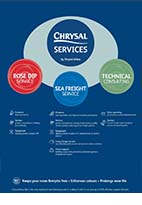Featured Past Articles
Over the years Carton Manufacturers Ltd has established itself as one of the largest and most reliable corrugated box manufacturing plants in Kenya and is a key supplier of corrugated boxes to the industry.
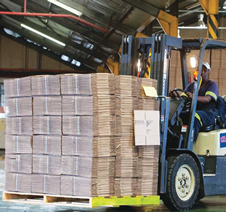 The company provides a total packaging solution from design to delivery, with products ranging from small pizza boxes to large flower cartons.
The company provides a total packaging solution from design to delivery, with products ranging from small pizza boxes to large flower cartons.
The plant is well equipped with state of the art machinery and a team of multi skilled employees has made ‘Next day service the norm’.
All production is bespoke and fully tailored to meet the customer’s required specifications.
The plant is conveniently located off LungaLunga Road, on the outskirts of Nairobi’s Industrial Area, not far from the Jomo Kenyatta International Airport. It is ideally suited to ensure packaging requirements can be collected after delivering flowers or produce to the cargo center.
For large and regular customers we can also facilitate a delivery service directly to your farms at a nominal cost.
In addition to being price competitive, Carton Manufacturers has been able to supply light weight cartons with adequate strength to reduce freight costs for our customers.
Read more: Carton Manufacturers Ltd. : Thirty Five Years of Great Growth
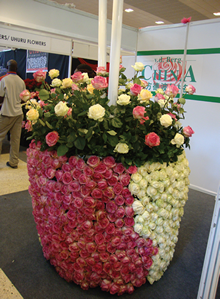 It’s yet another season for horticulture stakeholders and its affiliates. The rare occasion looks ‘glossy green and rosy scented’ but only for the sake of business attributed to the fast growing and highly lucrative floricultural sector.
It’s yet another season for horticulture stakeholders and its affiliates. The rare occasion looks ‘glossy green and rosy scented’ but only for the sake of business attributed to the fast growing and highly lucrative floricultural sector.
As the curtain of the 3rd IFTEX trade show opens on 4th-6th June, there will be no room for any shortcoming that may inhibit its success. All minds and hands that know what it entails have been up and down trying to put different pieces together to make what can be seen as the true spirit of the regional horticultural industry.
The event, since its first ever occurrence in 2012 has continued to aggressively spread its tentacles world over, luring to its importance the most reputed and less comparable companies in various business of sorts. The beginning of the event concept wasn’t such humble though the humidity and value that is endowed in the event itself reflects a totally different picture. Good institutional organization, positive projection and a solemn consideration of participants’ interests.
From the organizers the tussle process of liaising with potential exhibitors and buyers is becoming less stressful due to the consideration that people have absorbed the IFTEX concept and can no longer be enticed in order to participate in it. Instead they prepare in time and consider how best they can to make the best out of the entire event. Most of the exhibitors have participated previously and know pretty well what is entailed in the process.
Thanks to HPP Exhibitions who have tirelessly worked all round to have the horticultural fraternity exhibit their products and highlight their best practices. Over ninety percent of the exhibitors had confirmed participation in time of going to press. Surprisingly, only few stands had not been booked by the time.
 Briefly discuss Harry (background-personal and as a grower to current position General Manager Sunland Flowers)
Briefly discuss Harry (background-personal and as a grower to current position General Manager Sunland Flowers)
My name is Harry Kruger and I am the General manager of Sunland Roses Ltd. Before I came to Kenya to farm Hybrid Tea roses I studied Viticulture and Pomology in South Africa. I was busy making wine when I saw the opportunity by working in Kenya.
How do you see the future for African rose growers? What should they focus on to survive?
The world in general seems to have contradicting ideas about African rose growers. Some I’ve met still think that growers in Africa and especially in East Africa are still only concerned with the auction style of growing. African growers need to concentrate on optimizing the size of their businesses and focus more on quality rather than quantity. That being said, there are still many brilliant farms that grow for auction and that is great, but we should realize that the world is constantly changing and that the direct market is a huge force behind some of those changes. Without going into too much detail, the scenario is basically the following; other countries have been supplying the direct market place with very high quality stems for a long time and the growers in East Africa are fairly new in the game, so to speak. This is not to say that we lack anything or have inferior quality roses, but some markets seem to have this stigma, that long stemmed top quality Hybrid Tea roses do not come from Africa, but rather South America. This was perhaps true in the past, maybe about ten or fifteen years ago, but is no longer the case. Kenya, for one, produces stems that in my mind can definitely rival those from any other country. The goal should be to get markets to realize this and not simply put our flowers in the back and focus on the other countries they’re used to in the past.
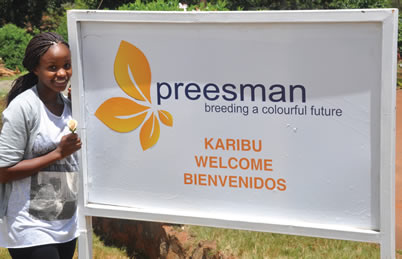 When I first visited Preesman’s new show case at Thika, it was on invitation of Jelle Posthumus, the commercial manager, Preesman. I met a team honoured to satisfy the curiosity of their customers who kept on tripling every minute courting for their attention. By count I could not tell the number of times they walked in to the new show case with a different customer then back to the reception area for either continual discussion with the same client or for a fresh discussion with a new client. On a close follow up, I realized that inside the show case was more technical and less commercial whereas in the reception was more commercial and less technical. These men had a wide knowledge of the two worlds of rose breeding. In between the customers, I stole some few minutes and managed to get a few minutes of interview with several of them.
When I first visited Preesman’s new show case at Thika, it was on invitation of Jelle Posthumus, the commercial manager, Preesman. I met a team honoured to satisfy the curiosity of their customers who kept on tripling every minute courting for their attention. By count I could not tell the number of times they walked in to the new show case with a different customer then back to the reception area for either continual discussion with the same client or for a fresh discussion with a new client. On a close follow up, I realized that inside the show case was more technical and less commercial whereas in the reception was more commercial and less technical. These men had a wide knowledge of the two worlds of rose breeding. In between the customers, I stole some few minutes and managed to get a few minutes of interview with several of them.
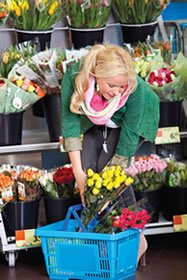 For many years, Dutch Flower Group (DFG) has been active in Africa and especially in Kenya, with respect to sourcing African products, like roses and carnations, as well as other varieties of cut flowers and foliage.
For many years, Dutch Flower Group (DFG) has been active in Africa and especially in Kenya, with respect to sourcing African products, like roses and carnations, as well as other varieties of cut flowers and foliage.
In the past, the activities of the DFG marketing and trading companies, based in Europe, were represented by two well-known local sourcing companies: Flower Sourcing Africa (FSA) and PROGRESS.
FSA was born out of the former DFG Kenya sourcing team. PROGRESS was the Mavuno Group, Professional Grower Export Support Services organisation, which after the DFG/Mavuno strategic alliance in May 2011, migrated to DFG. These two organisations for the last few years have been operating autonomously of each other, both sourcing from and supporting growers on behalf of Dutch Flower Group companies.
Due to the ever-changing market environment the way of working of Flower Sourcing Africa (FSA) and PROGRESS has become more and more comparable over the last few years. Both organisations are active on behalf of European multiple retail customers (i.e supermarkets) as well as floral wholesalers of Dutch Flower Group companies in The Netherlands and UK. These marketing companies deal with the leading parties in the consumer sales of cutflowers, bouquets and plants and work on a long-term basis together.
Helicoverpa Armigera (African Bollworm) Caterpillars In Flowers
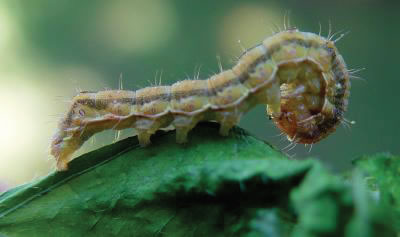 Caterpillars are seasonal pests to the flowers but when in season result in major losses to the flower industry as one caterpillar can cause damage to more than one flower. In flowers there are different kinds of caterpillar species which include helicoverpa armigera and spodopteraexigua and thus it’s important to know the exact pest that one has in their crop and out of these two, the helicoverpa species is the notorious and listed as a notifiable pest in the European market.
Caterpillars are seasonal pests to the flowers but when in season result in major losses to the flower industry as one caterpillar can cause damage to more than one flower. In flowers there are different kinds of caterpillar species which include helicoverpa armigera and spodopteraexigua and thus it’s important to know the exact pest that one has in their crop and out of these two, the helicoverpa species is the notorious and listed as a notifiable pest in the European market.
Description
Helicoverpa armigera commonly known as African bollworm is the main caterpillar that infests flowers in green houses and outdoor ones. It is a pest of roses, carnations, hypericum, gypsophilla amongst other flowers. It is a moth with the larval stages referred to as caterpillar being the destructive stage. It is unique in that the moth lays its eggs singly on the roses and specifically on the softest parts of the crop. In roses the eggs are found on the flower buds and petals. The eggs are small, yellowish-white, ribbed and rather dome shaped. The egg period is two days after which it hatches to a larva- the caterpillar.
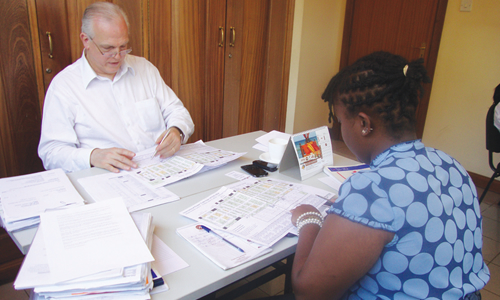 The International Flower Trade Expo (IFTEX) now enters its third year in Nairobi, Kenya, with high expectations on both quality and quantity from the organizers, exhibitors and visitors. The show, which debuted in March 2012, is quickly developing a magnetic pull for the flower industry fraternity not only in Africa but the world over.
The International Flower Trade Expo (IFTEX) now enters its third year in Nairobi, Kenya, with high expectations on both quality and quantity from the organizers, exhibitors and visitors. The show, which debuted in March 2012, is quickly developing a magnetic pull for the flower industry fraternity not only in Africa but the world over.
Speaking to Floriculture Magazine in Nairobi, IFTEX organizer Dick Van Raamsdonk was positive that the show would soon become a global leader if the enthusiasm and interest the exhibitors and buyers have displayed in the past two years is anything to go by. “Together with the expected internationalization, this event will soon become a regional flower trade fair not only for Kenyan flower growers, but for growers from South Africa, Zimbabwe, Tanzania, Zambia, Uganda, Ethiopia and other African flower producing countries,” said van Raamsdonk. This year, the show has also attracted South American growers making it more international unlike the Ecudor or Colombian which are purely national.


